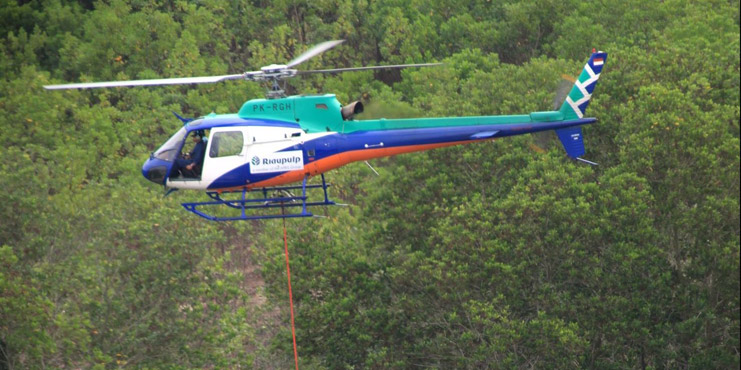No-burn in APRIL Concessions
Singapore has been blanketed by haze in past weeks. The company recently explained to Singapore’s Business Times and Today newspapers why reports of fires in APRIL’s concession areas in Riau Province are misplaced.
APRIL explained to Singapore’s Business Times and Today newspapers – the latter reporting from Riau at the invitation of the company — the fact that it makes no sense at all for APRIL to allow fires to burn on its concessions.
It would be akin to burning APRIL’s raw materials, the company’s Director of Sustainability and External Affairs, David Goodwin, explained to a Today reporter who viewed the APRIL concessions from the air.
APRIL showed the Business Times satellite images taken on June 24 which indicated that 10 of the 1,115 hot spots in Sumatra detected by the National Oceanic and Atmospheric Administration (NOAA) satellites were within the company’s 350,000 ha of concession areas.
And when the company checked those 10 locations, it found only one actual fire – on land set aside as community land, not the company’s operable land.
There were no fires at all on the company’s operable land. The other nine “hot spots” which the NOAA images had detected within APRIL concession land were found by APRIL helicopter patrols to be “false positives” on the satellite imagery. APRIL explained to the newspaper that these can be caused in a drought when heated peat soil goes on the move and is read by satellite imagery as multiple hot spots.
Today reported seeing the company’s firefighters putting out a blaze on the fringe of the concession area. Dr. John Bathgate, APRIL’s Senior Manager for Plantation Development, also pointed out plumes of smoke, including some from oil palm plantations, which maps showed were not part of APRIL’s concessions.
The Business Times reported that APRIL’s “zero burn policy” is backed by US$1.5 million invested in manpower, equipment and training, 665 Rapid Response Team members and 22 community-based fire prevention and control groups.
The newspaper said that the zero-burn policy had been in place since 1994 when the company started owning the plantations that supported its pulp and paper mills. APRIL also has a policy of not buying from third-party suppliers which it knows to be engaged in illegal slash-and-burn to clear land for planting.
Dr. Bathgate told Today that the company’s standard procedure is to investigate every reported “hot spot” within 500 metres of its concessions or that of its supply partners.
APRIL explained to both newspapers how it runs training courses for community farmers to prevent slash-and-burn by teaching alternative methods of clearing land, either with tractors or by hand with traditional tools.
The Business Times reported that “the company has also offered the farmers incentives to preserve the land. On the 28,000 ha of community land within its concession, APRIL has planted acacia trees, and undertaken to buy the fibre harvested from these trees from the community families.”
APRIL vice-chairman Bey Soo Khiang told the newspaper that these community farmers have no incentive to start a fire because their earnings from APRIL are based on what is produced on their land.
Meanwhile, APRIL continues with its regular land, air and water patrols in its vigilance against fires and has made additional commitments both to Indonesia’s national disaster agency and to the fire-fighting capabilities of its supply partners.





